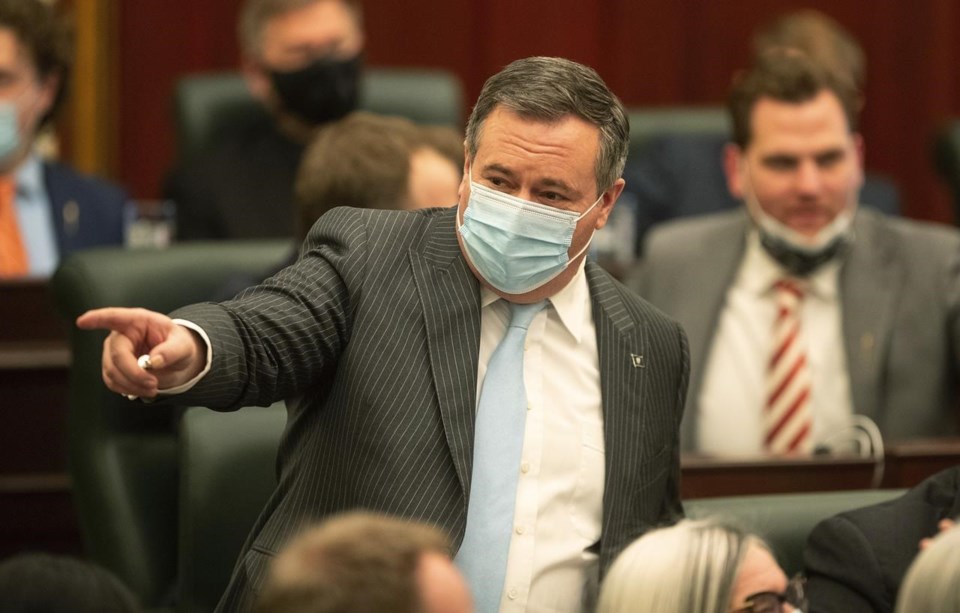EDMONTON — Alberta plans to temporarily end its tax on gas at the pump and to rebate some electricity costs to help consumers pummelled by high energy prices.
Premier Jason Kenney says the 13-cent per litre provincial tax is to be suspended April 1 for both gasoline and diesel.
He says the United Conservative government also plans to deliver a flat $150 rebate on electricity bills to almost all homes and businesses to offset high costs over the first three months of this year.
The combined new measures are projected to save consumers a total of $1.3 billion at the pump and provide $300 million in electricity rebates.
It’s not expected to affect the recently released budget as costs are to be covered by rising energy royalties.
“This massive tax relief is a response to skyrocketing costs at the pump and is going to provide Albertans with the relief that they need when the cost of everything is going up,” Kenney said at the legislature Monday.
Alberta drivers are facing what for them are onerous gas prices due to global demand and the war in Ukraine. Stations are selling fuel at $1.50 a litre or higher.
Kenney said those prices are based on oil purchased weeks ago and the price has risen even higher since then.
“We know there will be much higher prices at the pump."
The decision was a policy about-face. Last week, Kenney rejected a suggestion he offer drivers relief. He said it didn't make sense given that the federal government is set to increase its carbon tax at gas pumps by three cents a litre on April 1, which would claw back a portion of any savings provided by Alberta.
On Monday, Kenney said the government "decided to go ahead anyway because Albertans simply need the relief.”
High oil prices have dramatically reversed the thickness of Alberta's pocketbook.
After years of low prices and multibillion-dollar budget deficits, Alberta projects a balanced budget in 2022 on almost $14 billion in non-renewable resource revenues. That bounty is expected with the West Texas Intermediate benchmark oil price pegged at a relatively modest US$70 a barrel.
The current price is approaching US$120 a barrel.
The gasoline tax break is to continue through the spring and be adjusted on a sliding scale depending on oil prices. The full 13 cents will be restored if the price drops below US$80 a barrel.
Electricity rebates are still being worked out and have to be made legal through the passage of a bill. Dale Nally, associate minister of natural gas and electricity, says the plan is for three rebates of $50 for each of the last three months for about two million customers.
“The rebate will be applied right to people’s bills. No paperwork or confusing application forms will be necessary,” said McNally.
The government has already announced a natural gas rebate, but that doesn’t kick in until October and at a cost trigger point the Opposition NDP says is likely never to be reached.
Finance critic Kathleen Ganley said Monday's announcement doesn’t do enough.
“Albertans are struggling right now. The cost of everything is going up, and many of these rising costs are a direct result of UCP policy,” she said.
“The UCP’s latest plan falls well short of what’s needed and Albertans will continue to struggle with basic costs.”
In British Columbia, filling up has topped more than $2 a litre, but Minister of Public Safety Mike Farnworth said the Liberal government isn't planning to reduce its tax on gasoline. He said gas prices are driven by events outside provincial control and there’s “no simple solution" to rising fuel costs.
The Opposition NDP is urging the Saskatchewan Party government to bring in a tax break for drivers, given that global uncertainty is also boosting the province’s bottom line.
“But those increased revenues have not made it down to working families just trying to make ends meet at the end of the month,” said finance critic Trent Wotherspoon.
This report by The Canadian Press was first published March 7, 2022.
Dean Bennett, The Canadian Press



